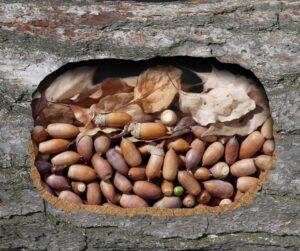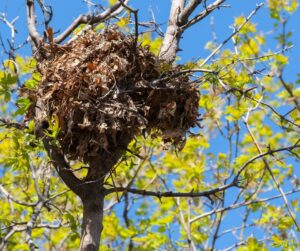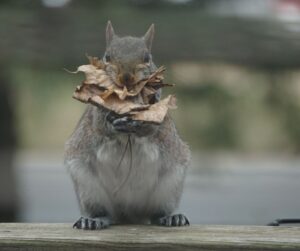WESTCHESTER COUNTY #
WESTCHESTER COUNTY #
Labor Day has come and passed, and summer will soon be on its way out. As we get ready for the holidays and the colder weather of fall and winter, you might notice squirrels are more commonly out and about, scurrying across treetops and scavenging for food. Squirrels spend most of the summer and especially fall building up large storages of food that can satisfy them through the winter. Squirrels will also eat as much as possible, packing on fat stores that can keep them warm and sustain them when food is low. Additionally, squirrels will begin building nests inside trees or attic spaces to provide shelter for them and their young during the colder months.
If you have squirrels causing damage on your property, don’t panic. Squirrel populations can be easily handled through habitat modification and a good trapping and exclusion program. Westchester Wildlife can help, we offer the best squirrel trapping, removal, and exclusion services in Westchester County. Don’t get stuck with squirrel roommates this winter, contact our team to get started today with a FREE estimate at (914) 760-5713!
During the fall, squirrels will be constantly on the move, searching for food they can consume to pack on the pounds or to store in a cache for the winter. Squirrels are major omnivores, and will eat pretty much anything that they can get their paws on. The main staples of the squirrel’s diet are nuts, seeds, and fruits, which they will scavenge for from trees, gardens, and birdfeeders. You might find squirrels feeding on plant roots and mushrooms. Squirrels also enjoy human foods that are high in fat or sugar, like cheese or cereal. If you have pet food that you are leaving out overnight, squirrels will raid these bowls for the food inside. Squirrels will also go after unprotected bird eggs, as well as some insects, grubs, worms, and small lizards.
 While squirrels will eat pretty much anything edible, they prioritize nuts and seeds above all else, as these can be stored inside their food caches for later use. Nuts and seeds can be eaten during the cold, dead, winter months, when food like plant roots, bird eggs, and insects are scarce. Squirrels store their food in caches, either in a scatter system or a larder system. Scatter systems involve squirrels digging numerous shallow pits, with a few nuts or seeds placed in each, and then over the winter months, digging them back up and eating them. Larder systems involve squirrels storing massive amounts of nuts and seeds in one location, like a tree cavity. If a squirrel has gotten comfortable enough in your attic, they might store these larder caches inside your attic space or even your wall voids. Discovering a large amount of nuts and seeds stored somewhere in your home is a surefire sign that squirrels are nesting on your property.
While squirrels will eat pretty much anything edible, they prioritize nuts and seeds above all else, as these can be stored inside their food caches for later use. Nuts and seeds can be eaten during the cold, dead, winter months, when food like plant roots, bird eggs, and insects are scarce. Squirrels store their food in caches, either in a scatter system or a larder system. Scatter systems involve squirrels digging numerous shallow pits, with a few nuts or seeds placed in each, and then over the winter months, digging them back up and eating them. Larder systems involve squirrels storing massive amounts of nuts and seeds in one location, like a tree cavity. If a squirrel has gotten comfortable enough in your attic, they might store these larder caches inside your attic space or even your wall voids. Discovering a large amount of nuts and seeds stored somewhere in your home is a surefire sign that squirrels are nesting on your property.
 Squirrels stay active throughout the winter, continuing to dig up their food caches from the fall and search for any scarce food that they can find. However, during especially cold or snowy days, squirrels will stay inside their nests, sleeping and lowering their metabolism to conserve heat and energy. There are two main types of squirrel nests: dreys and cavity nests. Squirrel dreys are the large, scraggly clumps of dead leaves and twigs that you will see high up in large trees. Dreys are usually about 20 feet up, preferably in a tree that bears nuts, and located at the fork of two strong branches. While they look sharp and uncomfortable on the outside, the inside is usually made of soft moss or pine needles. Cavity nests are built inside a hollow tree or attic space, lined with leaves, moss, pine needles, straw, and more. Cavity nests provide squirrels with greater protection from harsh weather, heavy precipitation, and predators. Your home’s attic space provides the perfect spot for cavity nests, as the heat from your home and your soft, fluffy attic insulation provide them with a comfortable place to raise their young.
Squirrels stay active throughout the winter, continuing to dig up their food caches from the fall and search for any scarce food that they can find. However, during especially cold or snowy days, squirrels will stay inside their nests, sleeping and lowering their metabolism to conserve heat and energy. There are two main types of squirrel nests: dreys and cavity nests. Squirrel dreys are the large, scraggly clumps of dead leaves and twigs that you will see high up in large trees. Dreys are usually about 20 feet up, preferably in a tree that bears nuts, and located at the fork of two strong branches. While they look sharp and uncomfortable on the outside, the inside is usually made of soft moss or pine needles. Cavity nests are built inside a hollow tree or attic space, lined with leaves, moss, pine needles, straw, and more. Cavity nests provide squirrels with greater protection from harsh weather, heavy precipitation, and predators. Your home’s attic space provides the perfect spot for cavity nests, as the heat from your home and your soft, fluffy attic insulation provide them with a comfortable place to raise their young.
Squirrels can be a major nuisance when they decide to settle down on your property for the winter. Squirrels will gnaw and scratch at any cracks or gaps they can find in your roof, soffit, fascia board or rake board, and once they get inside your attic, they will rip up and soil your insulation. If you are starting to see a suspicious amount of squirrels on your property and you want to deter them from sticking around, then removing things from your yard that attract squirrels is a great start. Removing bird feeders, securing outdoor trash cans, taking in all pet food at night, and regularly removing nuts, seeds, and fruit that fall in your yard will help eliminate common food sources for squirrels. Having a licensed wildlife removal company like Westchester Wildlife come and inspect your home carefully for any entry points and then sealing these entry points can keep squirrels out.
 If squirrels have decided to pick your attic space as their winter home, contact the experts at Westchester Wildlife for the best squirrel trapping and removal services in Westchester County, NY. As the cooler weather of fall begins to set in, squirrels will feast on any food they can find to pack on fat, and they will start storing nuts and seeds around their territory in caches to revisit later, when food is scarce. Squirrels will nest inside tree branches, tree cavities, or, most preferably, your attic space, where they will rip up and soil your insulation. Squirrels are rodents, meaning they have prominent front teeth that never stop growing. In order to keep the length of their teeth manageable, they will gnaw on anything they can find. In your attic space, that can include wooden beams and the rubber covering around wires, which can react with the insulation and any outside nesting material and cause a house fire.
If squirrels have decided to pick your attic space as their winter home, contact the experts at Westchester Wildlife for the best squirrel trapping and removal services in Westchester County, NY. As the cooler weather of fall begins to set in, squirrels will feast on any food they can find to pack on fat, and they will start storing nuts and seeds around their territory in caches to revisit later, when food is scarce. Squirrels will nest inside tree branches, tree cavities, or, most preferably, your attic space, where they will rip up and soil your insulation. Squirrels are rodents, meaning they have prominent front teeth that never stop growing. In order to keep the length of their teeth manageable, they will gnaw on anything they can find. In your attic space, that can include wooden beams and the rubber covering around wires, which can react with the insulation and any outside nesting material and cause a house fire.
If you have squirrels inside your home, don’t panic. Our team of licensed wildlife control operators can safely trap and remove all the squirrels that have gotten inside your home. Afterward, we will repair the damage they created while getting inside, sealing off their entry points and preventing them from returning. Contact Westchester Wildlife today to get started with a FREE estimate at (914) 760-5713!
Toll Free: 800.273.6673
Phone: (914) 760-5713
PO Box 579 Brewster,
NY 10509 USA
* Westchester Wildlife, LLC is not affiliated with the County. All services are fee based.
Copyright © 2025 Westchester Wildlife LLC. All Rights Reserved.